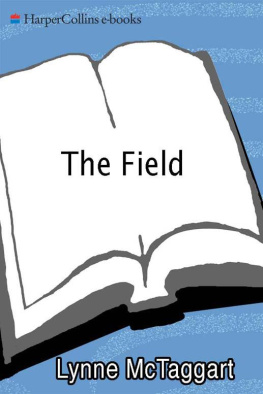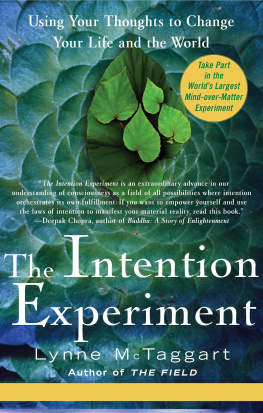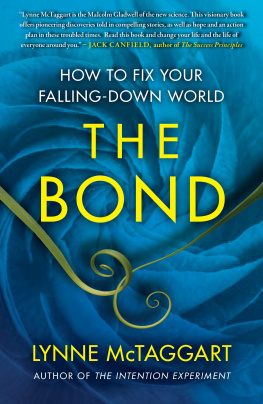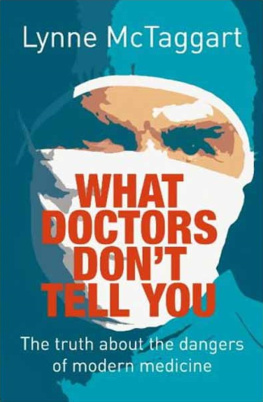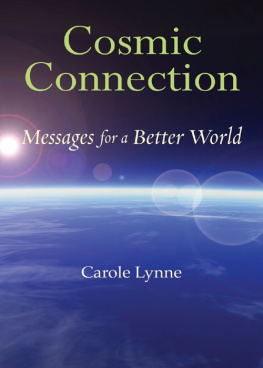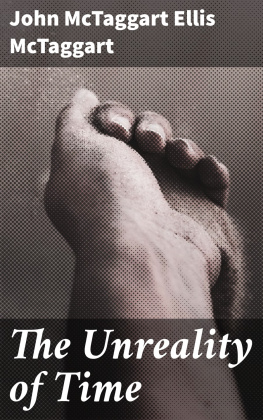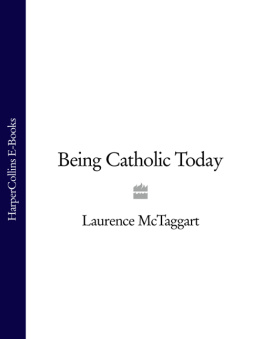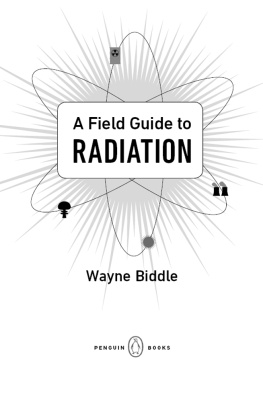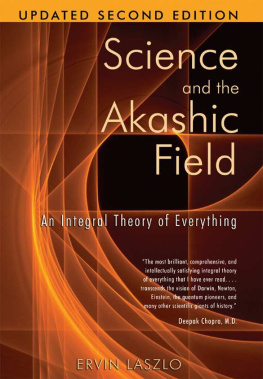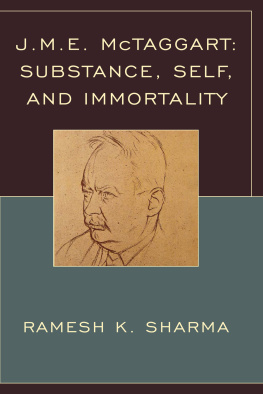T HE
FIELD
THE QUEST FOR
THE SECRET FORCE
OF THE UNIVERSE
Lynne McTaggart

FOR CAITLIN
YOU NEVER WERE ALONE
Physics may be about to face a revolution similar to that which occurred just a century ago
Arthur C. Clarke, When Will the Real Space Age Begin?
If an angel were to tell us about his philosophy many of his statements might well sound like 2 x 2 = 13.
Georg Christophe Lichtenberg, Aphorisms
Lynne McTaggart on the Web
To visit Lynne at her official Web site, and for Living the Field master classes, conferences, workshops, and products, as well as Lynnes regular blogs and podcasts, go to www.livingthefield.com.
To participate in her Intention Experiments, please visit www.theintentionexperiment.com.
For her health publications, go to www.wddty.com.
CONTENTS
M Y MOTHER DIED four days before Christmas. We spent that grim last week of 1996 in her house in Florida, burying her, clearing out her possessions, tying up the hundreds of loose ends involved in ending a life. Sifting through the flotsam and jetsam of her bedroom one afternoon, I spotted a small maroon keepsake box under the bed and uncovered, next to a pink baby album and a few faded early Polaroids, a bundle of all my letters home from college.
I opened a few of the multicolored envelopes and sat back to read, in the loopy handwriting of my youth, a blow-by-blow account of my first year away from home. Amid a catalog of imagined accomplishments tacit reassurance to my parents of the soundness of their investment one passage stood out: Today, I am going to learn astronomy.
I smiled, recalling this upstart younger self, but any amusement was quickly dispelled by the realization that my mother would never share this moment with me. She of all people would have immediately grasped my true meaning I am now going to take on all of astronomy in a single day she whod been so entertained by, so invested in this particular character trait, an early certainty that any behemoth across my path could be safely wrestled to the ground.
Today, I am going to learn astronomy . That line became a kind of catchphrase between my husband and me during the writing of this book. For a non-scientist like me to take on this project began to seem no less preposterous than trying to swallow the whole of astronomy in a single gulp.
The Field began as a confidence trick. I persuaded my publishers to fund what was essentially a voyage without a compass to see if there was such a thing as human energy fields. I began, as journalists do, by scavenging. I attended conferences. I read scientific papers. I contacted frontier scientists all around the world.
At a certain point I began to recognize, first with wonder and then alarm, that I had trespassed into dangerous new territory, a fledging science in the very act of its creation. The scientific foundation that we had all believed in, on which all our confident assertions about ourselves and our place in the world presently rested, was disintegrating right in front of me. The book that Id talked my way into writing was going to require no less than redefining our present concept of reality.
Today, I am going to learn astronomy . For a number of years, while researching The Field and subsequent work carried out in this area, I was patiently tutored in quantum physics by some seventy-five frontier scientists. I badgered, cajoled, demanded, and wheedled from each one of them countless hours, up to twenty interviews apiece, teasing out explanations, eventually wresting some crude translation for concepts that often exist for the physicist as pure mathematics. What exactly is quantum coherence? Why does the Zero Point Field exist? I would take their frequently incomprehensible answers and play them back via a metaphor until we could both agree on a lay approximation.
In the process I attempted to engage in a Socratic dialogue, posing each discovery as a philosophical problem to be placed in a wider context. Is there consciousness or just the Zero Point Field? Nevertheless, apart from a few impassioned individuals, such as physicist Hal Puthoff, Princetons former dean of engineering Robert Jahn, and Jahns colleague psychologist Brenda Dunne, the scientists studiously avoided metaphysical implications. No one had been willing to discuss, at least not in public, the wider picture the collective meaning of so much individual discovery or indeed to synthesize all of this material into a whole. That task, I realized with a gnawing unease, was being left to me.
For several years, I paced my hallway, sobbed at my desk, ignored my children, and left my other work in a pile on my desk. I held nightly discussions with my husband, a philosophy graduate, on arcane subjects: What exactly are time and space? If we arent looking, does the universe disappear? Take time out of it and it all makes sense, Bob Jahn once remarked to me in what was meant as a throwaway line. Was that possible? Or, more to the point, was that now an imperative?
During this time I wrote in a fevered panic, layering the manuscript like a cake, adding a new layer of meaning as each nuance became clear to me, the final layer added only a few months before the books publication.
At a certain point, I began to write in a manner suggesting that the process was happening through me. Every morning I would go to my computer, and words and concepts would pour out of me in a language that felt foreign until I recognized that Id found a new voice and a new subject, or that they, in fact, had finally found me. I would reread the book when it was first published with a sense of astonishment that any of it was in fact my work.
I launched my journalistic career in the 1970s as an investigative reporter, and that hard, fact-based approach to my work has never left me. For many years I have edited a newsletter called What Doctors Dont Tell You , a critique of modern medicine. Although, after years of studying the limitations of orthodox medicine, my sympathies lie with the alternative variety, I still demand scientific proof. I am not given to Eastern esoterica or mysticism, and I tend to decry the fluffy end of New Age spirituality, all claims of quantum medicine without hard evidence, and any overarching or inchoate uses of the term energy. There is little of the woo-woo about me.
Nevertheless, the process of creating The Field changed the messenger. Once this alchemical process was finished, I emerged as a person not only with a different voice, but also with a radically different world view. The remarkable discoveries of these scientists suggested to me that modern man was viewing the world through a blurred lens, and that applying these new discoveries to our lives would require nothing less than making our world anew.
Joan Didion once observed that we tell ourselves stories in order to live. Of all our stories, it is the scientific ones that most define us. Those stories create our perception of the universe and how it operates, and from this, we shape all our societal structures: our relationships with each other and our environment, our methods of doing business and educating our young, of organizing ourselves into towns and cities, of defining the borders of our countries and our planet.
Although we perceive science as an ultimate truth, science is finally just a story, told in installments. We learn about our world in piecemeal fashion, a process of constant correction and revision. New chapters refine and often supplant the chapters that have come before. With the discoveries that are enumerated in this book and those that have occurred since its publication, it is now clear that the story weve been told is about to be replaced by a drastically revised version.
Next page
